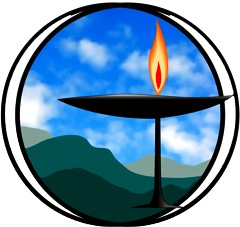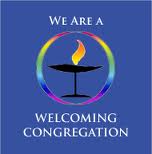Presenters
Index Page
Barker, Geraldine
Bodner, Mark
Burton, Laura
Castleberry, Kasey
Davis, Sam
Davis, Terry UU minister
Frost, Edward UU minister
Kibler, Myra
Nicholson & Brown
Sally Pamplin
Robison, Gerald
Seidman, Karl
Sheber, Larry
Sherod, Bob
Simmons, Antoine
Tremblay, Alexandra Immunologist
Waddell, Donna
Walker, James
West, Herb & Myrna
Woehr, Terry
Wood, Bruce
Other Sources
What I Learned in the First Minute of Church
By Myra Kibler
This presentation was made before the congregration of Mountain Light UUC on 2009 June 14.
"This is the day we are given. We didn't earn it. We don't deserve it. Nevertheless, it is ours to seek the goodness thereof."
The Rev. Burton Carley, at Church of the River in Memphis, always began each service with those words. After processing down the aisle of the church there on the bluff of the Mississippi River, a church with stadium seating, all facing front to magnificent two story high windows across the entire front, Rev. Carley would mount the spiral staircase to the New England style pulpit, resplendent in his formal robes with his white hair – it was a dramatic moment. He would throw his arm full length toward the window onto the Mississippi River and a great expanse of sky above and say in his preacher-powerful voice, "THIS IS THE DAY WE ARE GIVEN…"
My first response was, "What do you mean we don't deserve it? Are we not worthy of being alive?" I thought Unitarians believed in the worth of every human being? After hearing the same pronouncement every week, and working on it in my mind, I came to realize the true import of the statement. Life is a gift, it says. We didn't do anything to earn our life. We were given it. And now it is OURS. And our obligation is simply TO SEEK THE GOODNESS THEREOF.
Six months after leaving Church of the River for a new job in Atlanta, I set out to hike the Appalachian Trail. Most of you have heard me talk about this life-changing experience. I set out at a low point in my life. I'd given up a marriage because my husband would not follow me to the only tenure track college teaching job I could find; he found another woman instead. That job ended, position cancelled, and my mother and father died while I worked a retail job for a pittance and failed to care for them as I should have in their last year because I couldn't leave my new job. I'd been fired from a previous one, so was desperate to make good on this one. Gradually the awareness formed that I was wasting my life and needed to get perspective. I was overworked, overweight, had high cholesterol, didn't sleep well. Everything was amiss. So I did the best thing, and most uncharacteristic thing of my life. I packed a backpack, locked my door, and walked away. I took a copy of Tich Nhat Hahn's Walking Meditation with me and set out to walk north and let the walking, the being in the woods, the sleeping under the stars – let living simply in nature restore my balance. It may be similar to the desperate person who turns his life over to God and says, my problems are bigger than I am, YOU take them. I really believed that leaving the stresses of working and commuting and living close to the natural world would somehow reset my balance if I could just let it.
The first weeks on the trail were hard. My pack was too heavy, the weather was cold and wet. And I lost my copy of Walking Meditation. Nights were sometimes miserable when I couldn't get warm, not yet having learned how to live comfortably in a hollow log, and there were those mornings when I looked out into relentless rain and had to piece together enough resolve to get up and go forward. People dropped off the trail in great numbers. One day I came upon another woman I had hiked with on and off. She was standing at a road, where the trail crossed, but she was just standing there in a light rain. I stopped and made some small talk, probably about the weather, and she said, "I'm tired of being wet, and I'm tired of being cold. I'm going home." I pushed on, but my feet were heavier. Should I too cash it in and go home? Get warm and dry, have a cup of tea, a scone from Starbucks?
And it was then, I think, when those words surfaced in my brain: THIS IS THE DAY WE ARE GIVEN. It's a cold, rainy day somewhere in North Carolina. WE DIDN'T EARN IT; WE DON'T DESERVE IT, BUT IT IS OURS TO SEEK THE GOODNESS THEREOF. And from then on, it became my mantra. It got me going many mornings, and it sustained me through hard times on the trail, physical hard times and psychological hard times. Through hikers will tell you that the hardest part of a through hike is not the wear and tear on your body, which is considerable, but the psychological difficulties. My mantra helped me with both. Take what you are given, what you can't change, and make the best of it. It may be tough going right now, but what is over the crest of that next hill? What will I see ahead. What encounters are there to have. What goodness is there in this day?
Since beginning to think about this talk, I've encountered through the magic of television, three excellent examples of people who encountered much worse obstacles in their lives than I did on the Appalachian Trail. I doubt that they had the benefit of my specific mantra, but they are excellent examples of it.
Lance Armstrong, the cyclist who had testicular cancer that went to his brain. He had cancer in several parts of body, and the treatment of it took him to the edge of life. As soon as he was able, he began to work at building back his body, this time in a specific way, concentrating on building cycling muscles. It was like building a race car putting in only what contributes to speed and none of the extraneous parts. And he went on to wind the Tour d'France 7 times. He claims that he is stronger now for having had the cancer. And he has formed an organization to work for fighting cancer, LIVESTRONG. His example of facing adversity, maybe the very worst adversity and coming back stronger is an inspiration to cancer survivors and to all of us. He is a model of someone who took what was given and made the most of it, including turning then to help others. I even think that he became a better person as well as a better cyclist because of his experience with cancer.
Lance Armstrong also inspired another person who followed his example, Michael Fox. Fox has lived twenty years now with Parkinson's disease. It has robbed him of his muscular control, made everyday activities such as getting out of bed, brushing his teeth, walking, into monumental tasks. He has largely lost his acting career, which he loved. But he too has taken what he was given and sought the goodness thereof. He has followed Armstrong's example of raising awareness and funds for research into Parkinson's, has lobbied for stem cell research, and has shown the world by his example that the disease does not define his life. He has just published a book called, Always Looking Up. He calls himself an optimist. I think that is just another way of taking what was given and seeking the goodness in it.
And finally, because we could go on and on, there is the woman who received the first American face transplant. She is a mother who was shot in the face by her husband. It destroyed her nose and cheekbones and jaw. But this horrible disfigurement didn't destroy her spirit or define who she was. And it was her spirit, her sense of herself and her resilient sense of humor that convinced doctors that she was a good candidate for this experimental procedure, sure to get media attention. If you have seen her on TV, you can see that she is far from lovely. Doctors plan several more surgeries after which she may look more normal. But even now, she can appear on TV, laugh at herself – be amazed at how she used to worry about her weight. And she takes the time to speak with people who show revulsion upon seeing her – like the child in the grocery store who screamed and told her mother she'd seen a monster – she will speak with such people and show them the picture of herself before the gunshot as she used to be and explain that she is still the same person, just with an injury. Clearly someone who sees life as a gift and she is out to find the goodness in it.
Accepting the given and seeking the goodness is not only for dark days and horrible "givens". It is also for sunny days, for blessings, for talents and gifts. THIS IS THE DAY WE ARE GIVEN. Maybe it's a cool sunny day, just the best! Maybe you have achieved wonderful things, have a happy family, all that you need. And money. Maybe you even have plenty of that. Then this is the day you were given. You were given the genes, the conditions, the love – all that you needed to do well, to be well. Then it is still your obligation to seek the goodness thereof. What is goodness? Where do we look for goodness? How do we know it when we find it? These I believe are religious questions. What is of importance? What is of value? For each of the three examples I mentioned, Lance Armstrong, Michael Fox, and the face transplant woman, helping others was a component of their response.
So think about what you seek in each day. Most of us move through the landscape of our lives checking off our lists of tasks, duties, obligations, etc. We live within our patterns. How much of what we do is for self-gratification, for security, for recognition, and how much for goodness? What do we value?
This I believe is the job of religion. To help us see what is of value. To raise our consciousness and sensitivity about the goodness in human existence. It matters not what version of God we believe in or what dogmas we embrace. What matters is that we place what we value most at the center of our consciousness. And when we can do that – the difficulty of which is not to be underestimated and which requires a constant revaluation and awareness – when we know what is of ultimate value, we know what to look for and how to seek the goodness in each day.






